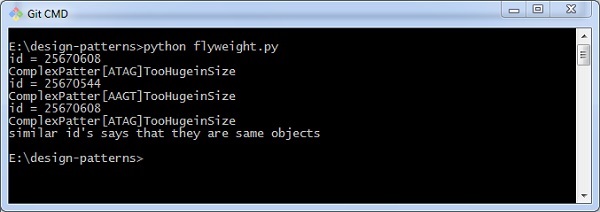
- Python 设计模式教程
- Python 设计模式 - 主页
- 引言
- Python 设计模式 - 要点
- MVC 模式 (Model View Controller)
- Python 设计模式 - 单例
- Python 设计模式 - 工厂
- Python 设计模式 - 建造者
- Python 设计模式 - 原型
- Python 设计模式 - 外观
- Python 设计模式 - 命令
- Python 设计模式 - 适配器
- Python 设计模式 - 装饰器
- Python 设计模式 - 代理
- 职责链模式
- Python 设计模式 - 观察者
- Python 设计模式 - 状态
- Python 设计模式 - 策略
- Python 设计模式 - 模板方法
- Python 设计模式 - 轻量级 (Flyweight)
- 抽象工厂
- 面向对象
- 面向对象概念实现
- Python 设计模式 - 迭代器
- 字典
- 链表数据结构
- Python 设计模式 - 集合
- Python 设计模式 - 队列
- 字符串和序列化
- Python 并发
- Python 设计模式 - 反
- 异常处理
- Python 设计模式资源
- 快速指南
- Python 设计模式 - 资源
- 讨论
Python 设计模式 - 轻量级 (Flyweight)
轻量级模式属于结构设计模式类别。此种模式提供减少对象数量的方法。它包含各种有助于改进应用程序结构的特性。轻量级对象最重要的特性是不变性。这意味着它们在构建后不能修改。这种模式使用 HashMap 存储引用对象。
如何实现轻量级模式?
以下程序有助于实现轻量级模式 −
class ComplexGenetics(object):
def __init__(self):
pass
def genes(self, gene_code):
return "ComplexPatter[%s]TooHugeinSize" % (gene_code)
class Families(object):
family = {}
def __new__(cls, name, family_id):
try:
id = cls.family[family_id]
except KeyError:
id = object.__new__(cls)
cls.family[family_id] = id
return id
def set_genetic_info(self, genetic_info):
cg = ComplexGenetics()
self.genetic_info = cg.genes(genetic_info)
def get_genetic_info(self):
return (self.genetic_info)
def test():
data = (('a', 1, 'ATAG'), ('a', 2, 'AAGT'), ('b', 1, 'ATAG'))
family_objects = []
for i in data:
obj = Families(i[0], i[1])
obj.set_genetic_info(i[2])
family_objects.append(obj)
for i in family_objects:
print "id = " + str(id(i))
print i.get_genetic_info()
print "similar id's says that they are same objects "
if __name__ == '__main__':
test()
输出
以上程序生成以下输出 −

广告